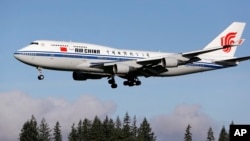Boeing has announced that Chinese companies have agreed to buy 300 jets from Boeing. The 250 single-aisle 737s and 50 wide-body jets carry a list price of about $38 billion.
The record order was announced as Chinese President Xi Jinping addressed about 600 Boeing employees inside an assembly bay at the Everett factory, just north of Seattle, Washington.
The deal, first reported by China's official Xinhua News Agency, also calls for the U.S. aerospace giant to build a plant in China.
Earlier Wednesday, Xi met with a high-powered group of 30 chief executive officers from some of the largest U.S. and Chinese businesses.
CEOs of Boeing, Microsoft, Starbucks, Amazon, Apple, IBM and General Motors, among others, were in attendance as Xi reminded them that China's economy was doing well with big growth potential and that his country was working on being more open and transparent.
Xi also touted the ties between the U.S. and China, saying that as of August, 65,000 U.S. businesses were in China, investing a total of $76 billion. Chinese investment in the U.S. is rising, he said, with 1,600 Chinese companies in 44 states that directly created 80,000 full-time jobs.
In what was billed as a major policy speech late Tuesday as he began his weeklong U.S. visit, Xi called for better relations with Washington.
"If China and the U.S. cooperate well, they can become a bedrock of global stability," Xi said. "Should they enter into conflict or confrontation, it would lead to disaster for both countries and the world at large."
Cyber dialogue
The Chinese leader also addressed a wide range of other issues that have upset U.S.-China ties, including cyber security, which President Barack Obama said would figure prominently in their one-on-one talks later this week.
"The Chinese government will not, in whatever form, engage in commercial theft or encourage or support such attempts by anyone," Xi said, repeating Beijing's assertion that it was the victim, not the perpetrator, of such attacks.
China is willing to set up a "high-level joint dialogue mechanism with the U.S. on fighting cyber crime," Xi said, in an apparent attempt to reassure business leaders alarmed about the growing threat of cyber attacks.
U.S. officials have been calling China's alleged cyber espionage a major stumbling block to improving U.S.-China relations.
The Obama administration has suggested imposing sanctions on Beijing, and the president said Washington was preparing "a number of measures" aimed at showing Beijing that "this is not just a matter of us being mildly upset."
Currency value
Xi also said China would not lower the value of its currency to boost exports. That is a long-standing worry among many U.S. officials, made worse by Beijing's surprise recent devaluation of the yuan.
The United States is pressing China to avoid "quick fixes" for its economy, White House chief economist Jason Furman said Tuesday. He said China's recent loosening of controls on the yuan "caused turmoil" in global financial markets.
South China Sea
Another area of disagreement that is expected to be discussed is China's controversial territorial claims in the South China Sea.
In his speech Tuesday, Xi stressed that China did not want confrontation with other nations and did not want to impede freedom of navigation in the region.
China has been carrying out land reclamation projects in the Spratly Islands, parts of which are also claimed by the Philippines, Vietnam, Malaysia, Brunei and Taiwan. Earlier this week, Xi told The Wall Street Journal that the Spratly Islands had been Chinese territory since ancient times.
"China's development and maintenance of facilities on some of our garrisoned islands and reefs in the Nansha Islands does not impact on or target any other country, and it should not be overinterpreted," Xi told the paper.
The U.S. has demanded that China stop those activities, calling them out of step with international norms and a risk for sparking conflict in the region.
Human rights
China's human rights record is another source of friction. When the Chinese leader spoke Tuesday in Seattle, dozens of protesters gathered to condemn what they saw as Beijing's harsh policies in Tibet and its crackdown against other political dissidents.
Xi is also likely to experience protests in Washington and New York, where he plans to address the U.N. General Assembly.
Susan Rice, Obama's national security adviser, said earlier this week that U.S. officials would continue to push China to stop detaining activists, to allow more freedom of speech and to eliminate restrictions on religious practices.
"It's absolutely true that it's a big and complicated relationship, and so there are a lot of topics vying for attention," acknowledged Sophie Richardson, China director at Human Rights Watch. "But we certainly think that the deterioration of the rights situation in China under Xi merits special attention.
"We also try to remind people that the same laws and independent institutions in China that would better protect human rights — like an independent court system, respect for the freedom of expression — are also essential to a healthy trade relationship and better diplomatic partnering, and many other aspects of the relationship," she told VOA.
VOA's Victor Beattie contributed to this report.




